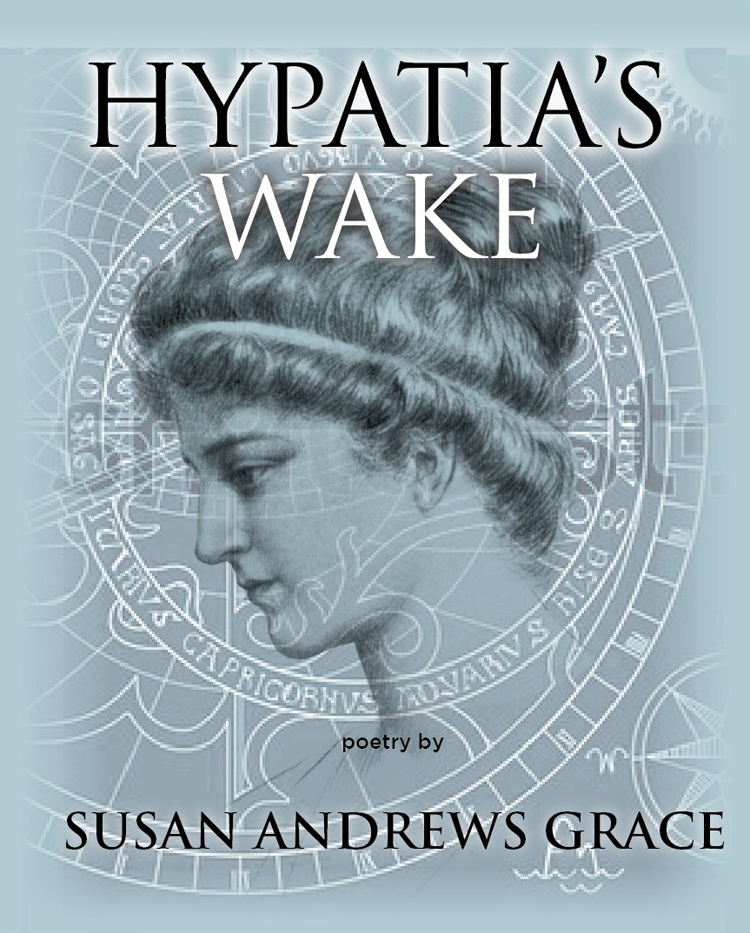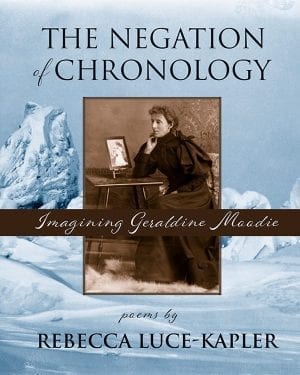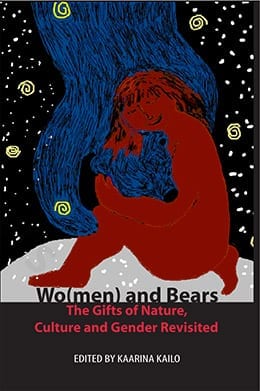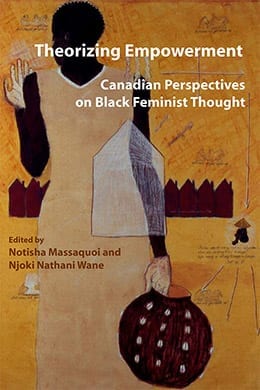This compelling poetry collection presents Hypatia of Alexandria (355–415 CE) the Egyptian Neoplatonic philosopher, astronomer, and mathematician. Often credited as the first female mathematician, little else is known about Hypatia, leading to many false and fanciful representations of her. Hypatia’s Wake addresses these and the reliable truth about her life and death.
The double bind, a situation in which a person is given two different messages one of which negates the other, features largely in Hypatia’s Wake. It links Hypatia’s life and example to the philosophical theory of contemporary French feminist Luce Irigaray, which examines the uses and misuses of language in relation to women. If we make amends to history and the river of time by waking Hypatia’s death, we wake up to her life—and the significance of our loss.
“Hypatia’s Wake is a gorgeous and indispensable recalibration of Hypatia of Alexandria’s consummate genius. As always, Susan Andrews Grace’s poetry is fiercely intelligent with biting dashes of wit and playfulness. Andrews Grace loosens the historical stranglehold on Hypatia’s legacy and revitalizes this important thinker in one dazzling, ‘vastly feminine cosmos.’”
—Sylvia Legris, author of Garden Physic and Nerve Squall
“‘Language lost, signs buried, maps ript’—such is the trace, in history, of the unspoken and unspeakable. For Susan Andrews Grace, this is the woman and her mother. In composing Hypatia’s Wake, the poet performs the feminist work of retrieving and sifting through the fragments that remain of Hypatia of Alexandria, Neoplatonist philosopher, mathematician, and astronomer—who in 415 AD was murdered (flayed, dismembered, and burned) by a mob of Christian monks. Andrews Grace brings Hypatia back from dereliction, composing her scattered parts into a beautiful, complex portrait of the philosopher-teacher. History is cut and woven with speculation; patriarchal ‘knots’ and ‘double binds’ are teased out. The ‘wake’ (a vigil for the dead) floats in the long ‘wake’ of Hypatia’s death. In terms of style, Andrews Grace takes great care with the page, with spacing and indentation, delighting the reading eye. Here, she has written such elegant poems—recalling, for me, the grave style and timeless matter of H.D.’s later poetry.”
—Hilary Clark
KNOT
Inter-twining rope, one free end
being passed through a loop
drawn tight, but also
A lump thus made or
Ornamental bow of silk, lace, braid
or other narrow goods or
A hard, gnarled portion of a tree or
Cross-grained mark on lumber sawn or
Cluster or group of things or
People such as those on the church steps
After the wedding ceremony,
A bond or union, the marriage knot
Enlargement in a muscle or
A problem, something not easily
solved
or
In nautical terms, a division of log time,
marked by pieces of cloth
or knotted strings
at equal distances, and
used to determine the rate
of a ship’s motion
which followed the stars
above and made
Hypatia invisible.
THE WOMAN AT ALEXANDRIA—DAUGHTER IN DÉRÉLICTION
iii
(.)(.)
Alexandria forever is Alexandria minus Hypatia.
Think of the day after Hypatia’s murder—
water, universal solvent, rain,
pools and puddles diluted her blood,
and sorrow between paving stones.
Solution of condolence equals water of equivalency.
Hypatia’s first Alexandria was her mother’s womb
her mother’s waters were the great fluidity
their placenta was negotiation
woman is watershed plus dividing rivers of water and air.
Woman philosopher equals watershed plus no return.
“NOTHING IN EXCESS” and “KNOW THYSELF”,
most famous adages at the Oracle of Delphi, were
taken seriously by Hypatia: she lived as a cultural Greek
in cosmopolitan Alexandria.
A wedding body of white,
shiny, plastic grocery bags
caught in a chain-link fence,
suspends prairie wind, abrading its gloss,
tearing spaghetti-like cells
from each other, impossible
decomposition.
It’s not the dress but the body
for the wedding, walks down the aisle,
death and re-birth
hover in tulle.
What a modern bride
can learn from Hypatia’s life
what history and plastic carrier bag
have in common, how
we bring forth to mother.
HEGEL’S VICIOUS CIRCLE, AS PERTAINS TO HYPATIA
a
Woman is a woman and therefore
incapable of governing
because she is a woman.
Georg Wilhelm Friedrich’s Antigone makes clear Hypatia’s mistake—
Hypatia had no religion so she could not bury
her dead brother for religious reasons.
She did not have a brother
and he did not die.
Hypatia’s mistake was to live to be old
without a husband to baby or a brother to bury,
or an uncle to disobey.
Hypatia lived beyond these, dared to be
philosopher, death knell to her pleasure, divinity.
Hypatia, an old woman, rejected freedom to kill herself,
her life not a tragedy while alive, she had influence
and lived to the last moment of her murder.
Hypatia taught in a closed circle. Her students
came to her house daily and followed a secret schedule.
Hypatia, a Platonic scholar, taught the history of
philosophy, and followed in Plotinus’s Neoplatonism.
Something in Hypatia leapt to the dust
and profusion of ethers and storms
to joy of knowing the stars,
superstition about planets swept aside.
Hypatia may have known earth is a planet too
in harmony with other geometries—
bodies fall down, not up, and spheres play
in harmony, Earth a province of the cosmos.
Fallible order includes famines
in every time.
Nothing changes Hypatia’s wake.
The moon passively white and cratered, revolves
force behind the fall,
orbits equal.
Isaac’s genius discovery in his miracle year of 1666
rested upon Hypatia’s work: Euclid’s Elements of Geometry.
Hypatia fell into history’s abyss.
Isaac’s posterity good, standing
on a giant or two. We swim the rivers
materia and consciousness
their plait of time, delight upon awakening,
meeting again, ancient and current
we know but we don’t know we know
Hypatia’s presence
our blue jewel
lapis gravitas.
HYPATIA’S STRING THEORY
The varieties of science, rolled up
like thread on spools, infinitesimally small,
cloud spun into small and smaller dimensions
pull of moon and stars
equal to the distance from Earth’s pull
(we’re talking gravity here, not gravitas)
ends and depths of existence
are closer than we think
if we could only see
outside the slice of discovery. Our galaxy turns
inside-out like an Egyptian pillowcase in Hypatia’s house
feathery geometry falls, snow of particles,
hints for the dubious, along a membrane of doubt,
as time unwinds
and atoms unite, re-unite, and break apart.
Girls fall into galaxies
gravity acts according to laws
a girl in late antiquity or modern Egypt
nearly always obeys—not only nature
but limits on thought relative to the moon’s force,
thought’s acceleration—smaller than the apple in her hand.
Seed, germ, cell,
charm—I think therefore I am.
seeds in the girl/fruit of the womb/
thought in the man: we are
alike, light instant.
Time dilates at high speed,
specularization of mother
nature, René and I/eye,
science slips by.
Isaac’s second law of motion, F=ma
equivalent to the girl’s attraction to earth, as she
falls, gravitationally—
to be continued









Inanna Admin –
Hypatia’s Wake by Susan Andrews Grace
reviewed by Lisa Timpf
The Miramichi Reader– January 15, 2023
https://miramichireader.ca/2023/01/hypatias-wake-by-susan-andrews-grace/
In Hypatia’s Wake, Susan Andrews Grace provides a deeper look at the Egyptian Neo-platonic philosopher, astronomer, and mathematician Hypatia of Alexander. Hypatia, who lived from 355-415 CE, has been credited as being the first female mathematician, and has had many students who admired and respected her. However, she fell victim to political jealousy, and around age 60, she was brutally murdered.
Some of the poems are prefaced by excerpts from letters written to Hypatia from Synesius, one of her students. Others are kicked off with reference to historical writings, like Euclid’s theories, or the philosophies of Hegel and Descartes. Some segments riff off statements about Hypatia’s life and history. In each case, though, Grace uses the introductory bit as a jumping-off point for a poem.
While the bulk of the poetry reflects on Hypatia’s life and significance, Grace sometimes makes a link back to more recent times. For example, she notes:
Hypatia held her own with the mighty of Alexandria.
They’d have said in the 1950s,
she thought like a man
Truth was, men thought like her.
Because of its subject matter, some of the poems deal with difficult topics, including the manner of Hypatia’s death. Yet despite the darkness, there is both beauty and humour in Grace’s poetry. Hypatia, Grace says, “entertained Idea and / reined in stars with her astrolabe.” Grace writes:
If Hypatia were the sea, she would be immense,
no thought could draw a line to erase her
and time would drown, its river swallowed
in estuary . . .
Elsewhere, she comments
ends and depths of existence
are closer than we think
if we could only see
outside the slice of discovery. Our galaxy turns
inside out like an Egyptian pillowcase in Hypatia’s house
feather geometry falls, snow of particles,
hints for the dubious, along a membrane of doubt
A common refrain in the collection is the paradoxical nature of Hypatia’s life—and by extension, the lives of women throughout the ages. Hypatia was caught between competing expectations. Because she chose not to marry and not to have children, she was seen as not fulfilling the typical expectations of a woman. Yet, if she had fulfilled the typical expectations of a woman, she likely would have been denied the opportunity to spend the kind of time she wanted studying and teaching her favourite subjects. She was, in many ways, darned if she did and darned if she didn’t. As Grace puts it,
Paradoxical, Hypatia’s dilemma in Alexandria—
she goes into the streets as a free woman
is killed on the way home because
she goes into the streets as a free woman.
Grace notes that Hypatia’s accomplishments are far less celebrated in history than they might have been had she been a man. This invisibility is a critical point for Grace, who states, in a closing section titled “The Flesh of Invisibility,”
Hypatia lived and the flesh of her invisibility has not stolen her from us forever. We can claim her and wake her loss as we are awakened to her. When we give Hypatia back to the flesh of the world, we claim visibility.
She sees invisibility is a key issue for women:
…women’s history is invisible for the most part and yet it exists. If women do not partake in the history of the world it is because we do not partake of institutions and culture as full beings. If we have no history, it’s because we are not visible beings. If we are not visible, it’s often because we lack rights.
Part lament, part eulogy, part history lesson, part biography, Hypatia’s Wake is much broader than a series of poems and facts about a remarkable woman who, as Grace puts it, “fell into history’s abyss.” It is about women, invisibility, and the way we’ve been ignored and under-valued throughout the centuries. In reclaiming Hypatia’s story, Grace argues, we reclaim our own: “Hypatia’s ghost survives. / Remember.”
Inanna Admin –
Hypatia’s Wake by Susan Andrews Grace
reviewed by Carina Costom
Black Bear Review – February 15, 2023
https://blackbearreview.ca/writing/writers-den/hypatias-wake-book-review-by-carina-costom/
If you don’t know the work of Susan Andrews Grace, writer, artist, teacher, it’s a good time to discover a poet and a visual artist who has accomplished a significant body of work. Hypatia’s Wake is Susan Andrews Grace’s sixth book of poetry. Author Sylvia Legris has described Grace’s poetry as “…fiercely intelligent with biting dashes of wit and intelligence…” I would tend to agree, especially when the poetry leads one to the visual arts and the visual arts sends us back to the poetry of this multidisciplinary artist. To enjoy each piece is to be made thirsty for the ways in which Grace works intermodal variations to shed light. To study her poetry is to remember the texture of her visual art: organza, hand-sewn elements, pearls, fine red ribbons, copper wire, marriage boxes, galvanized steel, red wires, series of handmade small square wooden frames filled with colour, of tiny details, like so many microscope slides on display for examination by your heart, your mind, and both your aesthetic and ethical conscience.
In the U.S, Hypatia’s Wake was a finalist for the Barrow Street Press Poetry Prize in 2017. Philosopher at the Skin Edge of Being (Signature Editions, 2013), her fifth book, was shortlisted for the 2014 Fred Cogswell Award for Excellence in Poetry. What I’m saying is that her work is good. Really good. And she lives right here in the unceded territory known as Nelson being consistently relevant, with a knack for deep inquiry, research, synthesis, deconstructing, defining, refined esthetic, and even, generosity towards other artists.
For her power as a teacher, mathematician, and inventor in Ancient Greece, Hypatia’s fate was sealed by the darkness of her times. A shadow that lives still in our time. Reading about her at least made me awake to a fellow poet sister and just how dangerous it was – and still is – to speak. A wake is still a propos since just as I discover her, I must also mourn her and all the women and sisters, here and abroad who know the reality of being deleted from history for being a woman and having a vision.
Hypatia’s Wake is a poetic re-imagining of a woman of substance (Hypatia of Alexandria BC) by a woman of substance (Susan Andrews Grace) in a spirit of both re-membering, contextualizing, and perhaps, calling out the patriarchy and the his-storians. It is also a ”galvanization of feminine worth”; a highlighting of how, for so long, Hypatia was like her mother – “not named”; how Hypatia – as many women – are “spoken of in their absence”. The implication of these statements all point to voice. Poetic voice, prosaic voice, political voice, relational voice. Andrews Grace and Hypatia share many points, the least of which is that they are both teachers. Teaching artists are dangerous, subversive even, because they have no intention to teach you what to think, only, more disruptively, how to question and inquire. Read it. Get it. You’ll be glad you did.
To learn more about Susan Andrews Grace, visit: https://www.susanandrewsgrace.com